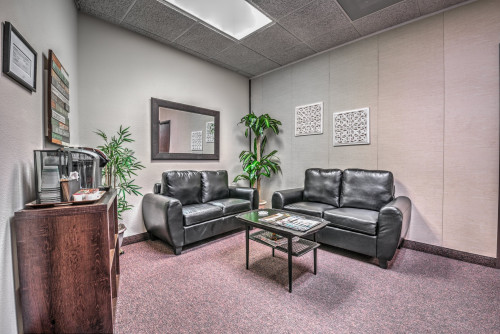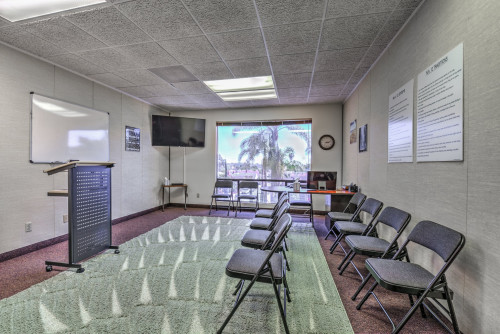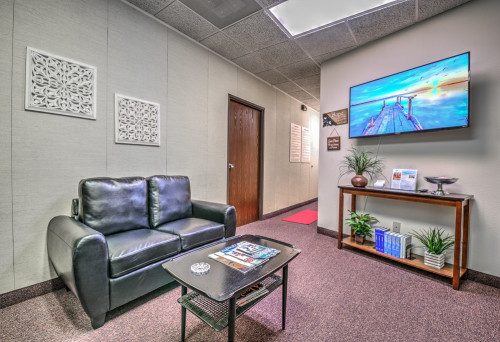






The Bridges of San Diego
Treatment Focus
This center treats substance use disorders and co-occurring mental health conditions. Your treatment plan addresses each condition at once with personalized, compassionate care for comprehensive healing.
Primary Level of Care
Outpatient treatment offers flexible therapeutic and medical care without the need to stay overnight in a hospital or inpatient facility. Some centers off intensive outpatient program (IOP), which falls between inpatient care and traditional outpatient service.
This provider hasn't verified their profile's information. Are you the owner of this center? Claim your listing to better manage your presence on Recovery.com.
Treatment Focus
This center treats substance use disorders and co-occurring mental health conditions. Your treatment plan addresses each condition at once with personalized, compassionate care for comprehensive healing.
Primary Level of Care
Outpatient treatment offers flexible therapeutic and medical care without the need to stay overnight in a hospital or inpatient facility. Some centers off intensive outpatient program (IOP), which falls between inpatient care and traditional outpatient service.
Provider's Policy
The Bridges of San Diego accepts most private insurance, including Humana, Beacon, HealthNet, Aetna, Magellan Health, Anthem Blue Cross Blue Shield, MHN, Tricare, and Cigna.
The Bridges of San Diego
The Bridges of San Diego
About The Bridges of San Diego
The Bridges San Diego provides outpatient treatment for addictions and co-occurring disorders. Their partial hospitalization (PHP) and intensive outpatient programs (IOP) include evidence-based education on the disease of addiction, individual and group therapy sessions, relapse prevention planning, spiritual development, self-esteem building, physical health and wellbeing education, and 12-Step facilitation. The Bridges offers a Family Support Program as well as a robust Alumni Program.
Partial Hospitalization Program (PHP)
The Bridges San Diego’s PHP meets 5 days a week from 10 a.m. to 3:30 p.m. The program offers a comprehensive, short-term, intensive clinical treatment approach, designed specifically to meet individual needs as an alternative to inpatient or residential care. The Bridges uses evidenced-based drug and alcohol education and group processing, teaches skills to cope with depression, anxiety, trauma and PTSD, and includes an introduction to the 12-Step recovery program.
Intensive Outpatient Program (IOP)
The Bridges San Diego’s IOP helps clients recognize the negative consequences related to substance use disorders. The program provides support and healthy solutions, and an appropriate action plan for each individual. IOP meets 3 times per week, 3 hours a day, for a minimum of 6 weeks, with both day and evening programming available. The program can help patients transitioning out of inpatient rehab, or patients looking for drug and alcohol treatment but are unable to take time away from work and family, or afford rehab in an inpatient environment.
Chronic Relapse Program
The Chronic Relapse Program offers group counseling separate from those who are in treatment for the first time. This program consists of individual and group sessions for 12 weeks, 3 times per week. The Chronic Relapse Program also includes continuing care maintenance for 6 months to one year after the initial program.
Family Support Program
The Bridges offers a Family Support Program to help family members experiencing anger, guilt, shame, or co-dependency as a result of their loved one’s addiction. The Family Support Program can help participants develop a “tough love” approach to dealing with family members that are currently struggling with substance use. Family services include individual and group counseling for a minimum of 8 weeks, 2 days per week.
Alumni Program
Once treatment concludes, patients stay socially connected with other alumni via weekly recovery meetings and other special sober events.

Center Overview
Treatment Focus
This center treats substance use disorders and co-occurring mental health conditions. Your treatment plan addresses each condition at once with personalized, compassionate care for comprehensive healing.
Joint Commission Accredited
The Joint Commission accreditation is a voluntary, objective process that evaluates and accredits healthcare organizations (like treatment centers) based on performance standards designed to improve quality and safety for patients. To be accredited means the treatment center has been found to meet the Commission's standards for quality and safety in patient care.
Insurance Accepted
Cash Pay Rates
Estimated Cash Pay Rate
Center pricing can vary based on program and length of stay. Contact the center for more information. Recovery.com strives for price transparency so you can make an informed decision.
Levels of Care








Your Care Options
Specializations
Twelve Step Facilitation
12-Step groups offer a framework for addiction recovery. Members commit to a higher power, recognize their issues, and support each other in the healing process.
Spiritual Emphasis
Spirituality connects patients to a higher power and helps strengthen their recovery, hope, and compliance with other treatment modalities.
Family Involvement
Providers involve family in the treatment of their loved one through family therapy, visits, or both–because addiction is a family disease.
Who We Treat
Men and Women
Men and women attend treatment for addiction in a co-ed setting, going to therapy groups together to share experiences, struggles, and successes.
Approaches
Twelve Step
Incorporating spirituality, community, and responsibility, 12-Step philosophies prioritize the guidance of a Higher Power and a continuation of 12-Step practices.
Spiritual Emphasis
Spirituality connects patients to a higher power and helps strengthen their recovery, hope, and compliance with other treatment modalities.
Evidence-Based
A combination of scientifically rooted therapies and treatments make up evidence-based care, defined by their measured and proven results.
Therapies
1-on-1 Counseling
Patient and therapist meet 1-on-1 to work through difficult emotions and behavioral challenges in a personal, private setting.
Family Therapy
Family therapy addresses group dynamics within a family system, with a focus on improving communication and interrupting unhealthy relationship patterns.
Twelve Step Facilitation
12-Step groups offer a framework for addiction recovery. Members commit to a higher power, recognize their issues, and support each other in the healing process.
Substances We Treat
Cocaine
Cocaine is a stimulant with euphoric effects. Agitation, muscle ticks, psychosis, and heart issues are common symptoms of cocaine abuse.
Prescription Drugs
It's possible to abuse any drug, even prescribed ones. If you crave a medication, or regularly take it more than directed, you may have an addiction.
Benzodiazepines
Benzodiazepines are prescribed to treat anxiety and sleep issues. They are highly habit forming, and their abuse can cause mood changes and poor judgement.
Ecstasy
Ecstasy is a stimulant that causes intense euphoria and heightened awareness. Abuse of this drug can trigger depression, insomnia, and memory problems.
Co-Occurring Disorders
A person with multiple mental health diagnoses, such as addiction and depression, has co-occurring disorders also called dual diagnosis.
Psychedelics
Hallucinogenic drugs—like LSD—cause euphoria and increased sensory experiences. When abused, they can lead to depression and psychosis.
Drug Addiction
Drug addiction is the excessive and repetitive use of substances, despite harmful consequences to a person's life, health, and relationships.
Heroin
Heroin is a highly addictive and illegal opioid. It can cause insomnia, collapsed veins, heart issues, and additional mental health issues.





